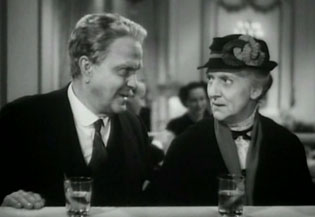|
|
Classic Movie Review: Make Way for TomorrowBy Josh SpiegelJanuary 10, 2011
Make Way For Tomorrow is such an achingly sad movie because it refuses to seem like a Hollywoodized version of what happened to average people during the Great Depression. By populating the film with character actors - the most familiar of whom is probably Thomas Mitchell, who plays George here and played Uncle Billy in It’s A Wonderful Life - and veering away from a happy ending, McCarey and screenwriter Vina Delmar create a fully believable world that becomes even more realistic with the crushing finale. Victor Moore and Beulah Bondi, who play Barkley and Lucy, act like they’ve been married for as long as their characters. There’s plenty of intimacy in their relationship, even in a one-sided phone call Lucy has halfway through the film, nearly bringing tears to the eyes of the bridge players listening in. I don’t want to make it sound like Make Way For Tomorrow is not an inherently watchable movie. It is. McCarey, even when not working in more inspirational or comedic fare, knows how to make a fast-paced, relatable film. Just make sure you have a box or ten of tissues handy when you watch the film. Though you may feel at various moments that some of the dialogue or story choices are almost heavy-handed in their emotion, I’d argue that there’s a strong through-line of emotional realism permeating every scene, especially the ones that seem most intent on tugging on your heartstrings. Make Way For Tomorrow is such a tough movie because it raises questions in every viewer. Now, I have to remind myself to be less selfish when I have to take care of my parents, and to just take care of them as best I can, no matter how annoyed I may get when one or both of them does something that strikes me as old-fashioned. I just have to remember that, and I’ll have won half of the battle.
|

|
|
|

|
Sunday, May 5, 2024
© 2024 Box Office Prophets, a division of One Of Us, Inc.


